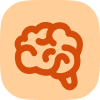Ever opened your laptop, stared at the screen, and completely forgotten why? Or read the same paragraph three times and still not absorb it? These moments may seem harmless, but they point to something more persistent: brain fog. It's not a medical diagnosis, but it's a very real cognitive experience: a mental haze that clouds focus, memory, and clarity.
More than ever, people are reporting symptoms of brain fog, especially in the wake of chronic stress, disrupted sleep, and information overload. The good news? You’re not stuck in the fog. With the right understanding and tools, you can restore mental clarity and improve how your brain functions day to day.
What Causes Brain Fog? A Multifactorial Disruption
A single issue does not cause brain fog, it’s often the result of multiple lifestyle and health factors colliding. These can include poor sleep, chronic stress, nutritional deficiencies, and even overexposure to digital stimuli.
As Verywell Mind explains, “Brain fog can result from lack of sleep, poor nutrition, stress, medications, or underlying medical conditions. It often causes forgetfulness, difficulty concentrating, and a general feeling of mental sluggishness.”
Stress hormones like cortisol can interfere with neurotransmitter balance. Sleep deprivation slows down synaptic communication. And nutritional gaps, particularly in vitamins like B12, can directly impair cognition.
A study in ScienceDirect found that “Vitamin B12 deficiency is associated with neuropsychiatric symptoms such as memory impairment and mental confusion, even when blood levels appear only mildly deficient.”
These findings show that what we eat, how we rest, and how we manage our environment directly affect how sharp—or cloudy—our minds feel.
Clearing the Fog: How to Regain Mental Clarity
Combating brain fog doesn’t require a total life overhaul, but it does require intentional shifts in habits that support neurological resilience.
Some strategies include:
-
Prioritizing sleep: Quality rest clears metabolic waste from the brain and resets attention mechanisms.
-
Balancing your diet: Nutrients like B12, omega-3s, and antioxidants support brain structure and cognitive signaling.
-
Practicing cognitive engagement: Just like the body, the brain needs exercise.
That’s where tools like the Infinite Mind App can help. Through short, targeted brain training sessions, it encourages mental stamina, working memory, and attention, functions most affected by brain fog. These exercises don’t just challenge the brain; they stimulate the formation of stronger, more efficient neural pathways over time.
The key is consistency. Just a few minutes a day can compound into sharper thinking, clearer focus, and renewed mental clarity.
Train Your Way Out of the Fog
Brain fog may feel intangible, but it’s deeply rooted in how your brain functions and how you support it. You can lift the haze and reclaim sharper thinking by addressing the underlying contributors like sleep, nutrition, and stress, and layering in proactive brain training.
The Infinite Mind App isn’t a quick fix. It’s a sustainable way to build the brain fitness needed to stay clear, focused, and sharp, even in the face of daily stressors. Because in a world full of noise, clarity is your greatest edge.














